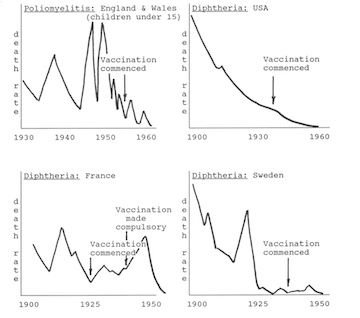The Historical Decline of Infectious Diseases
Sanitation or Vaccines?

Rene Dobos stated in his book, “Mirage of Health, 1959, by the time laboratory medicine became involved with medicine, humanitarians and social reformers of the nineteenth century had brought infectious disease under control through sanitation and hygiene programs, “When the tide is receding from the beach it is easy to have the illusion that one can empty the ocean by removing the water with a pail.”
“There was a continuous decline, equal in each sex, from 1937 onward. Vaccination [for whooping cough], beginning on a small scale in some places around 1948 and on a national scale in 1957, did not affect the rate of decline if it be assumed that one attack usually confers immunity, as in most major communicable diseases of childhood… With this pattern well established before 1957, there is no evidence that vaccination played a major role in the decline in incidence and mortality in the trend of events. – Gordon T. Stewart, 1977

from the 1850s public health initiatives building sanitary infrastructures, research and institutionalizing hygiene methods, improving nutrition, labor laws, and advances in scientific methodology came together and created a new matrix regarding how populations can maintain health for all people within crowded city populations and industrial centers. This happened within the span of 20 years!

Children stopped dying at a young age from diarrhea and common infectious diseases like smallpox and whooping cough. The Western countries had cleaned up its disease infested cities and industrial complexes and that work is what we see today. If you have read my previous articles the poor were driven from the commons through the industrialization of farming and moved into the cities that were not prepared for a huge influx of poor illiterate farmers. Throughout history it has been recorded infectious diseases like smallpox, typhus, and other diseases were called the poor man’s sickness.

The mass killers of humanity, infectious diseases start declining and began to fade away. By the end of the 1800s, smallpox lost its virulencey. Large populations of people stopped dying or becoming horribly ill from smallpox and it had totally disappeared from the USA. Smallpox was killing 1 in 5 people to 1 in 50 and continued on to 1 in 380. The disease still killed but had become very mild, to the point people couldn’t figure out what kind of disease they had when they became ill and developed rashes.

Around 1896 smallpox had become so mild in the South many people called the mild pox, chicken pox, the Cuban itch, elephant itch, Spanish measles, Japanese measles, bumps, impetigo, PortoRico scratches, Manila scab, Porto Reco itch, army itch, African itch, cedar itch, Manilia itch, bean, tch, Dhobie itch, Filipino itch, nigger itch, kangaroo itch, Hungarian itch, Italian itch, blood hives, eruptive grip, beanpox, waterpox, and swinepox.

It was common knowledge by those who lived outside of the rarefied circles of the bureaucracies of government regulators and manufactures of vaccines that sanitation had single handedly wiped smallpox off the map. Smallpox manufacturing was declining along with vaccination rates and yet small pox and other infectious diseases were on the decline.

“For forty years, corresponding roughly with the advent of the “sanitary era,” smallpox has gradually but steadily been leaving this country (England). For the past ten years the disease has ceased to have any appreciable effect upon our mortality statistics. For most of that period it has been entirely absent except for a few isolated outbreaks here and there. It is reasonable to believe that with the perfecting and more general adoption of modern methods of control and with improved sanitation (using the term in the widest sense) smallpox will be completely banished from this country as has been the case with plague, cholera, and typhus fever. Accompanying this decline in smallpox there has been a notable diminution during the past decade in the amount of infantile vaccination. This falling off in vaccination is steadily increasing and is becoming very widespread. Dr. Kilick Millard, “The Vaccination Question.”
What changed smallpox from a mass killer disease to something less lethal with very little fever and hardly any pain? The blisters were few and far between, maybe a dozen at the most. The red dots left by the eruptions faded within three weeks and left no scars. North Carolina in 1910 there were 3,875 cases with 8 deaths and by 1911 there were 3,294 cases without any deaths.
In the Journal of Infectious Diseases of 1913 there is a graph that shows in 1895 -1896, smallpox death had been declining for decades by 20 percent. By 1897 the death rate from smallpox was down to 6 percent and fell to 0.26 percent by 1908.


I remember catching chicken pox and measles back in the mid 1960s along with my sister we had a week off of school, a mini vacation. By the 1920s it was difficult to tell the difference between chicken pox and smallpox even in a clinical setting, chicken pox was recognized as a new form of small pox and most people were not vaccinated.
The medical community became concerned with the drop in vaccination by the general population. Their fear was that the mild form of smallpox may might revert back to it’s old habits of killing millions of people.

The medical community and manufacturers worried about their decline in patients and profits decided to complain against future pandemics that may never show up but you never know. It had been 20 years since large vaccination programs had vaccinated large populations (WWl) and any killer epidemics and spread through cities, counties, or countries. Most of the younger population hadn’t been vaccinated and the older population had not been revaccinated.
There were several outbreaks of small pox but it manifested it’s mild form around the 1920s-30s near the Mexican border towns, United States, Brazil, and most of Africa.
The Portuguese name of smallpox called Alastrim spread through many areas of the United States through 30 years, infecting many hundreds of people without changing into the more destructive from reported by American Health officers and epidemiologists.
There was a warning in 1921 that reminds me of the flu warnings we get were maybe a handful of people get sick and a few may die but nothing really happens. This horrible smallpox epidemic never showed up. It wasn’t because everyone was vaccinated because vaccine rates had dropped to almost nothing. The change of environment seems to have been the agent of change.
Smallpox had vanished from England and the Western world by 1946 without herd immunity from vaccination programs.

If you read standardized medical history books the decline of smallpox and other infectious diseases is attributed to vaccines. After reading the history of vaccines and the history of sanitary programs I have big doubts. Vaccination programs were never universally applied, while sanitation programs throughout the west were carried out transforming the cities and rural communities from filthy living conditions without clean water or healthy food to what we see today.

Maybe there are cycles of infectious diseases that burn their way through large densely packed populations like a fire burns its way through forests. Killing off the weaker trees and burning away infectious disease for the next generation of trees.

Smallpox infections fell to 50 percent by the end of the 1800s and completely vanished by 1948. From 1948 to 1963 smallpox vaccination continued resulting in an estimated 5,000 vaccine-related hospitalizations from rashes, secondary infections, and encephalitis. It wasn’t only smallpox disappearing but also other infectious diseases as well. The decline of all infectious diseases can be directly linked not to vaccination programs but sanitation, hygiene, and health programs.



 A link to My Blog
A link to My Blog
Great post ..
There is one cure for public malpractice is the fight against corruption
Thank you for sharing this with us
Bang on article, changes in sanitation rates were absolutely the primary factor in driving down disease infection rates. Vaccines piggybacked off this and falsely claimed to be the cause of the drop in infection rates. I've studied this data for many, many years and it's very obvious when looking at the graphs for both declines in disease rates and changes in sanitation as compared to when certain vaccines where introduced into the population. Thank you very much for sharing this important information! Much appreciated
You got my thesis! Thank you @silasdavid, I have many more graphs from back in the day but I didn't want to overload my audience. I will be getting into the technical issues with my next posts now that I have laid out the ground wok for sanitation, hygiene, and nutrition reducing infectious disease rates.
So sanitation efforts and cleaning up the environment were instrumental in not spreading decease. Kind of like today washing your hands and face helps to prevent the spread of certain illnesses. A no brainer. Prevention is always better than vaccination or a pill when possible. Not being around big crowds helps. I would think that vaccination is more of a last resort rather than the go to. Look around and see what you can do before injecting. Thanks so much @reddust. A fascinating read.
Thank you @enjoywithtroy, from what I've gathered so far vaccination programs have injured more people than helped people. From the graphs I've seen diseases were on the decline when modern vaccination programs of the 40s were not needed at all....Now I question why they were used when hygiene, sanitation, isolation, and nutrition worked so well and that will be where I go with the next articles.
If this vaccine is beneficial to humans, why not keep it?
Why is it defined at birth?
The question this article asks is.... "are vaccines needed?"
@reddust a large number of diseases that we call old diseases have been eliminated after the era of health safety and all people benefited from health coverage, the story of vaccines did not begin with the first vaccine–Edward Jenner’s use of material from cowpox pustules to provide protection against smallpox. Rather, it begins with the long history of infectious disease in humans, and in particular, with early uses of smallpox material to provide immunity to that disease. i think Food safety has had a major role in addition to the emergence of quality standards and control in all areas
The old diseases like smallpox were called the disease of the poor throughout human history. Smallpox material used from the past included pus from horse hooves, pus from infected cow udders, pus from infected lesions on humans without any kind of examination what was in the pus. Many say this is were syphilis came from. Cowpox only infects female cows and is not related to human small pox and the lymph fluid from animals injected into humans had nothing to do with human small pox either.
I do not think so many researches confirm that the cells of the body attack the animal vaccine human immunity is relatively weak @reddust
It was and is very common even today...
Anaphylaxis (including anaphylactic shock) and related phenomena such as angioneurotic edema; facial edema, and peripheral edema; Necrotizing retinitis (in immunocompromised individuals); Aplastic anemia; thrombocytopenia (including idiopathic thrombocytopenic purpura (ITP)); Varicella (vaccine strain); Encephalitis; cerebrovascular accident; transverse myelitis; Guillain-Barré syndrome; Bell's palsy; ataxia; non-febrile seizures; aseptic meningitis; dizziness; paresthesia; Pharyngitis; pneumonia/pneumonitis; Stevens-Johnson syndrome; erythema multiforme; Henoch-Schönlein purpura; secondary bacterial infections of skin and soft tissue, including impetigo and cellulitis; herpes zoster.
The history of vaccine has greatly help the western world especially the europe countries but the same can't be say of African countries. While the white colonize us in other to see our mineral resources and enslaves us, they should have also help with the provision of this vaccine to african countries.
Thanks @reddust
Actually my posts have been setting up the premise that vaccinations were a scam, bad science at its best!
Well, this writing full of history and knowledge, but the concern of matter, there are a lot of diseases that have no proper cure in the late history, but now there are proper ways to curb and control the diseases.
but now there are new diseases emerged, due to uncontrolled pollution, and how can we control them, it not restraint through vaccination, its about us, our everyday role to minimize the pollution, if not then this world must be at the verge of disintegration.
your contribution contains worth and awareness about smallpox, the political agenda of that time of pharmaceutical industry, but its the disease which is now under controlled, but the diseases which is now emerged are directly linked with the character of human beings, which does not take on serious manner....
Thanks a lot...
Blessed You...
Steem On...
Keep our food, water, and environment clean and avoid overcrowding people...It's pretty simple really. Nice to see you again @abdullahoaib <3
It's my pleasure to meet you again.....
Improved public health, nutrition and infrastructure development of major cities such as sanitation, as well as progress in medicine, such as the use of antibiotics and vaccines against infectious diseases, have led to a reduction in mortality. The high level of health services has reduced the mortality of infectious diseases.
Access to clean water, avoiding overcrowding populations, waste disposal, and healthy food are the key to curbing infectious disease and improved health.
Certainly healthy food and living in a clean environment will positively reflect on human health.
But now despite the development of major cities in terms of infrastructure there is a big problem is the pollution of the atmosphere and carbon dioxide emissions, especially in the industrial cities, this is a severe problem suffered by the great powers Camrica, for example, which is the first source of emissions and carbon dioxide in the atmosphere accompanied by diseases
very interessing post thank you for sharing

resteemed and shared in the steemit
Worth reading to this history i think we should food to save us properly and more care about this is the best way to keep safe from any dieaseas, because health is most important for human survive. You are explain is very well about vaccines. We should more carefull before anything do and inject. We should also care after cleans your hands and safe from any dirty jerms. Thankyou Mam for tell us in full of detail.
Health is wealth if human is good it has no need of vaccine you share a knowledgeful post ery small number of ppeople know about this keep it up
Wow its really amazing article.
Thanks for share. Wish you avery happy and bright future.
Vaccine is benificial for human but it has large effect also
Thanks for sharing its history I can not know about this keep it up God bless you
they are going to make humans more weak and weak
Vaya amigo que trabajo tan interesante, no tenia la menor idea de de todo lo que se tuvo que pasar para esto avances, gracias por compartir
Very nice health post...i always support health tips.....health is wealth...so awarefully of sanitation....
In the 3rd world, it's a great issue. The History of themselves is as like as before. need more awareness & support.
Well articulated write up.
Vaccines are actually of the best thing that has happened in field of immunology.
Despite the fact they are attenuated toxins which if improperly procesed might be harmful, yet they have really been of immense help in medicine.
Great post @reddust
posting a good friend, I upvote resteem yes, visit my post is also a friend yes
If you believe this post is spam or abuse, please report it to our DiscordYou got a 4.24% upvote from @buildawhale courtesy of @reddust! #abuse channel.
If you want to support our Curation Digest or our Spam & Abuse prevention efforts, please vote @themarkymark as witness.
Great article my friend :)
beautifull story sir @redddust its really helpfull
well i will do read this post as its in my feeds so i will read it .. now a bit busy and i love to read about history
If you believe this post is spam or abuse, please report it to our DiscordYou got a 17.18% upvote from @upmyvote courtesy of @reddust! #abuse channel.
If you want to support our Curation Digest or our Spam & Abuse prevention efforts, please vote @themarkymark as witness.
Hahhahah lol
Good post.
I like
thanks to you i got to know a lot about this :)
Very detailed post today you researched a lot about this thanks for sharing
click here.Congratulations @reddust, this post is the sixth most rewarded post (based on pending payouts) in the last 12 hours written by a Hero account holder (accounts that hold between 10 and 100 Mega Vests). The total number of posts by Hero account holders during this period was 342 and the total pending payments to posts in this category was $7811.75. To see the full list of highest paid posts across all accounts categories,
If you do not wish to receive these messages in future, please reply stop to this comment.
you just showed the side of it which no one talks about
i am very happy that i read this it was something i can't read it anywhere else
Sir the post very informative and everything mwntioned in post is praise worthy.I would love to visit ur blog and go through ur posts to get benefitted by your deep insight into topics related to health/science etc. I am eager to go through ur blog. I hope the content is thrilling.Waiting for ur next knowledgable post.Thankyou
One more historical event to add to this is that we saw the same trends with scarlet fever and typhoid fever. There was no vaccine, but its was also eradicated. Surprise!
Hey thanks for insight on this vaccines i dont believe in period you dont know whats in them. There are so many problems in the world today it would be extremely exhausting to discuss them all. Sorry you felt the need to unfollow me, it hard to keep up with everyone.
be well
@reddust
perfect
@reddust very nice work! I am going to save the graphs that you uploaded with your posts, as they are very informative. I also like those graphs because they reflect studies in different western countries so that helps to really see the bigger picture. Do you have a direct link to the original source where those graphs came from? I would really like to read more in details the original paper. Keep up the good work my friend! :)
Thank you so much for this amazing content !
That's great ! As a medicine student, I knew that the smallpox was something absolutely relevant in our past, but the way it advanced and affected all those people is unbelievable. Awesome post! Greetings from Venezuela ! Upvoted
Btw, that's a huge list of "small pox "different names hahaha
Hi @reddust!
I'm happy to include this article for my “CARE TO READ” CROSSWORD PUZZLE NO. 15.
Thank you for creating such awesome content!